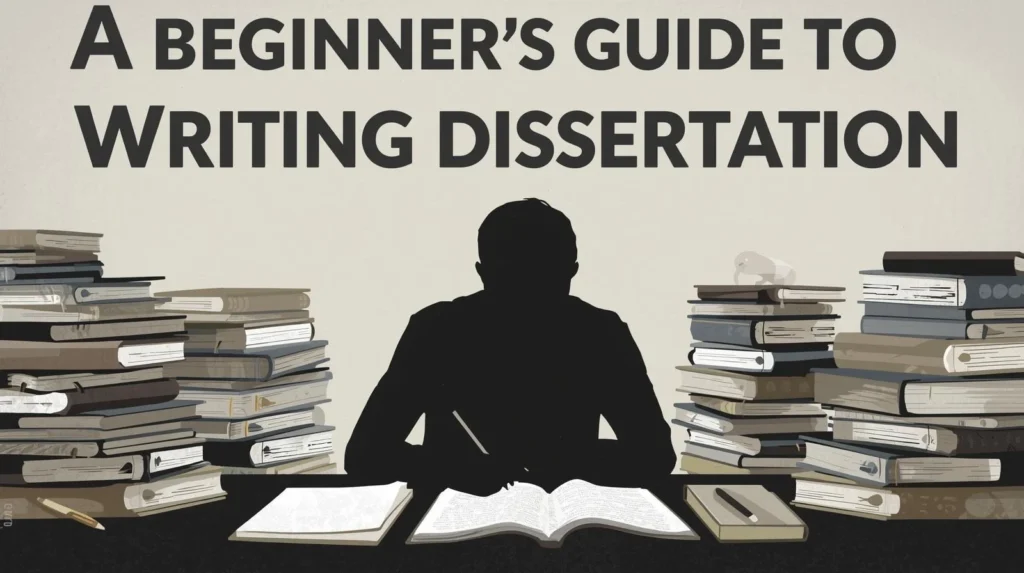Step 1: Get Clear on What a Dissertation Is
Think of your dissertation as a long, structured story about your own research. It’s your chance to explore something deeply, show what you’ve learned, and maybe even discover something new.
A typical dissertation includes:
- Introduction – what your research is about
- Literature Review – what others have said before you
- Methodology – how you carried out your research
- Results – what you found
- Discussion & Conclusion – what it all means
Why it matters: it’s your opportunity to prove that you can think independently, handle complex information, and contribute something original to your field.

Step 2: Choose a Topic That Speaks to You
You’ll be living with this topic for months—so choose something you actually care about.
Try this:
- Brainstorm things you’re curious about.
- Narrow it down to something specific and researchable.
- Make sure it fits your course or discipline.
- Chat with your supervisor to make sure it’s realistic.
Pro tip: A great topic often starts with a question that makes you go, “I wonder why that happens?”
Step 3: Dive Into the Literature
Before you write your own story, read what others have already written.
Here’s how to start:
- Collect books, journal articles, and past dissertations on your topic.
- Look for patterns, debates, and gaps—what’s missing?
- Organize your notes so you can refer back easily.
You’re not just summarizing here—you’re joining an ongoing conversation. Use this stage to show where your research fits in.
Step 4: Shape Your Research Question
Now that you know what’s out there, what exactly are you trying to find out?
Your question should be:
- Focused (not too broad)
- Doable (something you can actually answer)
- Meaningful (adds value to your field)
Example: How does daily social media use affect students’ concentration during study hours?
This question becomes the heartbeat of your whole dissertation.
Step 5: Plan Your Methodology
This part is all about how you’ll find your answers.
Ask yourself:
Will I collect numbers (quantitative), words (qualitative), or both?
Who or what will I study?
How will I gather data—surveys, interviews, experiments, or documents?
Are there any ethical issues I need to consider?
Be clear and honest about why you chose your approach—it shows you understand what you’re doing.
Step 6: Gather and Analyze Your Data
This is where your project comes alive.
Tips for this stage:
Stay organized—label everything clearly.
Back up your data (you’ll thank yourself later).
Don’t panic if things don’t go exactly to plan—research rarely does.
When you analyze, look for patterns, connections, or surprises.
Remember: it’s not just about what you find, but how you make sense of it.
Step 7: Start Writing (and Don’t Wait Too Long!)
Writing feels less scary when you break it into pieces.
Here’s the usual order:
- Title Page
- Abstract
- Introduction
- Literature Review
- Methodology
- Results
- Discussion
- Conclusion
- References & Appendices
Write a little every day—even messy drafts count. You can always tidy up later.
Step 8: Edit and Polish
Editing is where your dissertation transforms from good to great.
Checklist:
- Does each chapter flow logically?
- Is your argument clear and consistent?
- Have you checked grammar, formatting, and citations?
- Is your language formal but natural?
- Does your university require a specific referencing style (APA, MLA, etc.)?
Take breaks between edits. You’ll see things more clearly when you come back with fresh eyes.
Step 9: Submit (and Breathe!)
You’ve done the work—now it’s time to hand it in.
Before you click “submit”:
- Double-check your formatting and file name.
- Make sure all pages and references are in place.
- Save multiple copies (cloud + USB + email).
If you have a defense (viva), practice explaining your research out loud. You know this topic better than anyone else—own it with confidence.
Final Thoughts
Writing a dissertation isn’t just about research—it’s about learning how to think deeply, stay organized, and believe in your own ideas.
You’ll have moments of doubt (everyone does), but remember: Progress, not perfection. Every paragraph gets you closer to the finish line.
And when you finally print that final copy, you’ll realize—you didn’t just write a dissertation. You built something that’s entirely yours.
